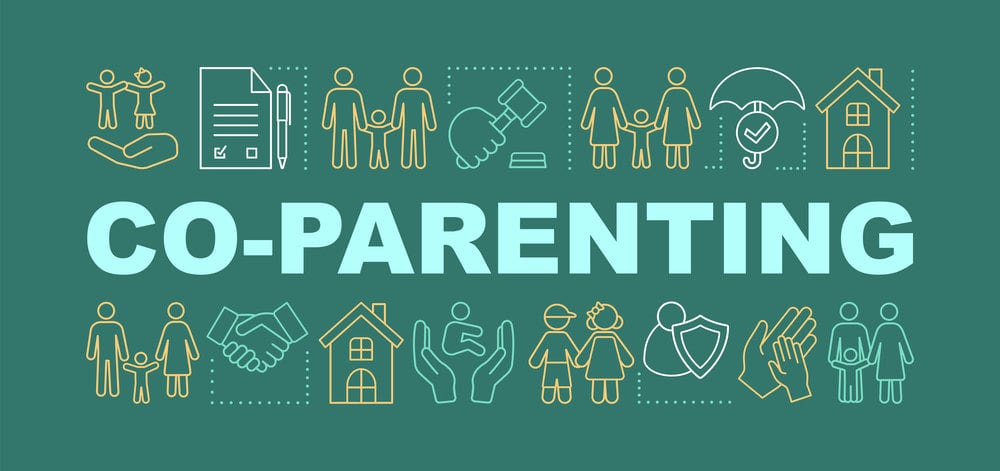Co-parenting can be a complicated and tense process. It’s tough when your ex-spouse is not following through on their responsibilities. If you’re wondering how to co-parent in Illinois, this article will help you understand the basics of co-parenting agreements.
Understanding Co-Parenting in Illinois
The divorce rate in Illinois has gone down significantly. According to Statista, there were only 1.3 divorces per 1,000 inhabitants. This rate has reduced by over half (from 3.8 in 1990). However, even with only 1.3 divorces per 1,000 people, things can still go wrong, especially if there’s a child involved.
When children are involved, both partners might want to get their custody. Most of the time, both parents get to work together to raise their children. Co-parenting is a term used to describe the process by which divorced parents can co-parent their children.
It’s essential to understand the legal and practical aspects of co-parenting in Illinois, which may include:
- Parenting plan: This plan outlines the rights and responsibilities of each parent, including parenting time (visitation) and decision-making authority for the child. If parents can’t agree on a plan, the court will establish one based on the child’s best interests.
- Best interests of the child: Illinois law places a strong emphasis on the best interests of the child when determining parenting arrangements. The court will consider factors like the child’s age, the child’s wishes, and the child’s adjustment to home, school, and community.
- Parenting time: Parenting time refers to the schedule for when each parent spends time with the child. It should be as detailed as possible and include holidays, vacations, and special occasions. The schedule can be flexible but should prioritize consistency and stability for the child.
- Decision-making authority: Illinois distinguishes between significant decisions related to the child, including education, healthcare, and religion. Parents may share decision-making authority (joint custody), or one parent may have sole decision-making authority, depending on the circumstances.
Smooth Divorce: Ending Terms on a Good Note
Ending your divorce on good terms is essential for everyone involved. You, your ex-spouse, and, most importantly, your children need to feel that their lives are moving forward in the best way possible.
To ensure this happens, there are some things you can do:
- Be respectful of each other in front of the children
- Communicate openly about how you want things done around the house
- Don’t badmouth each other (especially in front of the kids)
A lot depends on the attorney when it comes to ensuring a smooth divorce. The lawyer can act as a mediator and help with effective communication. Hence, you must find a family lawyer in your locality. You can go with a lawyer from your state but try to hire someone from the same city itself. Suppose you live in Geneva, Illinois. In that case, you should find a family law attorney in Geneva, Illinois.
Here are some reasons why you might consider hiring a local attorney:
- Familiarity with local laws and regulations: Local attorneys are well-versed in the specific laws and regulations in Geneva, Illinois. They have a deep understanding of local ordinances, court procedures, and legal precedents that can be crucial when handling your case.
- Courtroom experience: Local attorneys often have experience working in the local court system. This can be beneficial when navigating the legal process efficiently and effectively. They may have established relationships with judges, other attorneys, and court staff.
- Knowledge of the local legal community: Local attorneys are more likely to be connected within the legal community in Geneva. This can be helpful when negotiating settlements, finding expert witnesses, or collaborating with other legal professionals to build a strong case.
- Accessibility: When you hire a local attorney, they are more accessible for meetings, consultations, and updates on your case. You can easily schedule in-person meetings, which is essential for building a solid attorney-client relationship.
- Personalized service: Local attorneys often provide more personalized service and attention to clients. They may have a smaller caseload than larger law firms, allowing them to dedicate more time and resources to your case.
According to Abear Law Offices, Illinois lawyers can also help you with other aspects of divorce. For example, they can guide you with asset distribution, creating parental custody, making co-parenting agreements, etc. Divorce can be a complicated process, but the right attorney can help you navigate it easily.
Benefits of Co-Parenting for Children
Children need both parents in their lives. According to a study published in the Frontiers Journal, the time parents spend with their children is directly proportional to their well-being. Co-parenting allows children to maintain a relationship with both of their parents.
When children grow up with two parents who are actively involved in their lives, they learn valuable skills, such as:
- Independence: Children learn how to be more independent by taking responsibility for themselves and making decisions on their own. They also learn how to handle conflict resolution without relying on others to solve problems for them.
- Respectfulness: When children live with both parents equally, they have more opportunities to understand why each parent makes certain decisions. This helps build respect between adults and children alike.
Common Challenges in Co-Parenting
When co-parenting, remember that you and your ex have different parenting styles. You may have different ideas about how often your children should visit with their other parents. You might even disagree on where the kids should be during visits and whether they should be supervised at all times.
Divorce decisions can also result in challenges in co-parenting. This is especially true when one of the parents shows intimate partner violence (IPV). IPV is something that can have a significant impact on the child. If the child witnesses some form of IPV, it can negatively affect his or her mental health.
However, a study from the University of Illinois shows that IPV is not considered while making court decisions. The study concluded that IPV was documented in only a few divorce cases. Ignoring such things when making co-parenting decisions can pose severe challenges in the long run.
Another common challenge in Illinois is that fathers don’t have equal co-parenting rights. In Illinois, giving birth to a child does not give fathers the right to equal custody. They have to file for custody and get court orders to see their children. A bill was introduced in the Illinois House of Representatives in 2017. However, it died, and there was no progress.
Such regulations can affect the father’s mental peace, which can stay as it is even after he gets co-parenting rights. This can result in challenges later down the road. For instance, the father may feel he must do more than the mother to abide by the co-parenting agreements.
Strategies for Successful Co-Parenting in Illinois
To get the proper benefits of co-parenting for you and your child, you must develop and follow the right strategies. Here are some things that can help ensure success:
- Cope with conflict: You and your ex will inevitably have disagreements, significantly when raising your children. Both parents must handle these conflicts in a productive way that respects both parties’ opinions.
- Communicate with your ex: Communication is vital when co-parenting. You should maintain open lines of communication so you can share information about your children’s lives and make decisions together. You can use technology here to communicate frequently and effectively.A study from Sage Journals shows that parents can use technology-based mediums like text, emails, and social media to communicate with each other. The study also concluded that using such communication technologies for post-divorce co-parenting can yield positive results in parents’ relationships with their children.
- Be flexible: While you may not agree with everything your former partner wants, remember that this is his or her right. Being flexible helps create an environment where everyone feels comfortable expressing themselves without feeling attacked by someone else’s viewpoint.
Conclusion
As we’ve seen, co-parenting can be a challenging process to navigate. You must remember that you are not alone in this journey, and many resources are available. You can use these online and offline resources to help make co-parenting easier. With these tips in mind, we hope that you will be able to build a healthy relationship with your ex-spouse while raising children.




